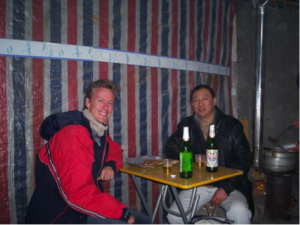Chinese dining may be quite different to what you do at home or at a European restaurant, so here are a few traditional tips you can try out as the Chinese New Year celebrations come to an end with the Lantern Festival on Feb 22.
If you’re invited to a person’s house, then you should consider it an honour. Make sure you turn up on time, bring a small gift for the host/hostess and leave your shoes at the door.
If at a restaurant, Chinese people typically use a round or square table.
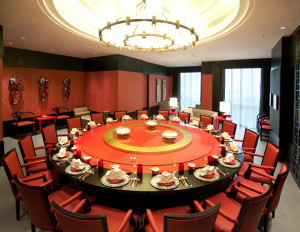
The guest of honour will be given a seat facing the door whilst the youngest or the person of the least importance would take the seat closest to the door.
The host begins eating first and offers the first toast.
In a Chinese meal, an even number of dishes should be ordered. Odd numbers of dishes would be appropriate only for occasions such as the meal after a funeral.
• Don’t dig in the food on a plate to find the best pieces
• Don’t pick one piece then drop it back in the plate and change to another piece
• Don’t let your chopsticks be covered with food juice or residue and don’t lick or suck your chopsticks
• Don’t use chopsticks to beat any utensils or to make any noise
• Don’t wave your chopsticks or use them like forks
• Don’t put chopsticks vertically in rice in a bowl since it resembles the incense sticks for the dead
• Don’t put chopsticks over your bowl because it means it’s an invitation for spirits to eat your dinner. Therefore it’s bad luck.
• Chopsticks should be returned to the chopstick rest after every few bites and when you drink or stop to speak. When you’re not using the chopsticks, place them on the chopstick rest or side by side neatly on the plate in front of you.
• Your chopsticks are for your personal use only, transferring food from your bowl or plate to your mouth. Rice can be eaten by holding the bowl close up to your mouth and using a quick shovelling movement with the chopsticks, Chinese style.
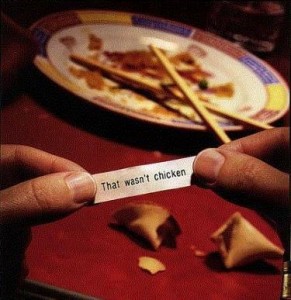
- The best dish should be put in front of the most important person in order to show your respect. Chicken head or duck head on a plate should not point at guests. The big bowl of soup should be placed in the middle.
- When you eat fish, it would be better if you just take out the skeletons after finishing one side of the meat than to turn the whole fish upside down because it is bad luck (resembles a boat being turned upside down).
- It could be frowned upon if you add soya sauce to your rice! Rice is meant to taste fresh but bland, as an accompaniment to the stronger flavours of the dishes.
- When transferring food from the shared dishes to your personal bowl, use the spoon or provided for each dish, or a pair of chopsticks for general use. It’s really frowned upon to suck or lick your own chopsticks, then help yourself to more food from the shared dishes! This is unhygienic and will put fellow diners off their food.
- If you’re eating food that someone has cooked for you, please don’t ask for soya sauce, chilli sauce or extra seasoning unless your host has mentioned that you might need it and offers it to you.
- You should also serve yourself from the area of the dish directly in front of you, rather than spooning from any other area.
- It’s more polite to serve yourself smaller portions, more frequently.
- Never eat the last piece from the serving tray.
- You should try everything that is offered to you.
- Do not pour your own drink. It shows a lack of protocol.
- Be observant to other peoples’ needs.
- The most common expression for toasting is Gan bei, meaning “dry cup”, or bottoms up.
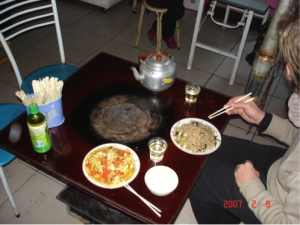
- Finally, if there’s some food left in a shared dish, but not quite enough for two helpings, then do ask if anyone wants it before finishing it off.
- Eat well to demonstrate that you are enjoying
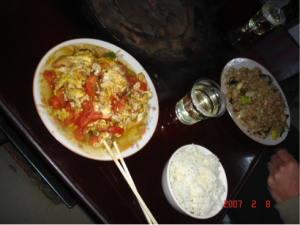 the food!
the food! - If you are the guest, remember not to leave too much food behind because it would mean that you don’t like the food.
- Guests should sample all of the dishes and leave something on the plate at the end of the meal. A clean plate indicates you are still hungry and it is the host’s responsibility to see that you are continually served food and drink.
- Do not put bones in your bowl. Place them on the table or in a special bowl for that purpose.
- Do not be offended if a Chinese person makes slurping or belching sounds; it merely indicates that they are enjoying their food.
- Cover your mouth while you’re using toothpicks.
Many of these are comparable to our “common courtesies” in the West but some are new and have interesting reasons behind them. Next time we have a banquet we’ll have to trial these and see how we go!
Finger Tapping
There is another ritual that has an historic origin. When you see tea-drinkers tapping the table with three fingers of a hand, do not think it is a superstitious gesture. It is a silent expression of gratitude to the member of the party who has refilled their cup. The gesture recreates a tale of Imperial obeisance.
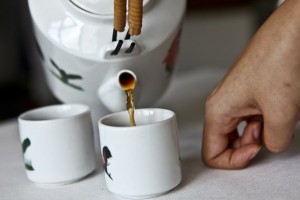
The story tells of a Qing Dynasty emperor who used to go out and about on his lands in disguise on inspection visits. While visiting South China, he once went into a teahouse with his companions. In order to preserve his anonymity, he took a turn at pouring tea as not to have done so would have revealed his special status. His shocked companions wanted to kowtow to him for the great honour he was doing them. Instead of letting them reveal his identity, the emperor told them to tap three fingers on the table. One finger represented their bowed head and the other two represented their prostrate arms. True or not, this is the basis for the custom of discreetly tapping your acknowledgment of a tea-drinking companion’s consideration.

